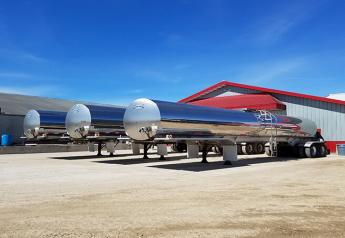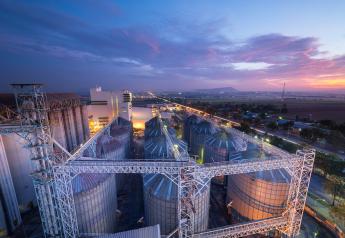Nebraska Dairy Seeks Food Waste to Expand Composting

A dairy farm in southern Lancaster County, Neb., wants to expand its composting operation by accepting food waste from area schools, villages and possibly from Lincoln.
"We're trying to get into the forefront of what I think is going to make a great business model," said Dan Rice, general manager of Prairieland Dairy.
The Lincoln Journal Star reports that model is based on his belief that combining manure from hundreds of dairy cows with tons of food waste makes much better compost than using dairy waste alone.
Prairieland Dairy at 13000 Pella Road has been composting dairy waste since 2002, selling the natural product to farmers, gardeners and greenhouses. Compost is made from decayed organic material, looks like soil and is used as fertilizer.
Rice is asking for a permit from the Nebraska Department of Environmental Quality to expand the annual waste capacity of his composting operation from 10,000 cubic yards to no more than 100,000 cubic yards.
He also seeks a zoning change from the Lincoln-Lancaster County Planning Commission that would allow a large-scale composting operation in an agricultural district and a special permit from the county to operate the expanded site.
Sara Hartzell, a county planner, said zoning regulations contain provisions for composting activities associated with public landfills but they do not address commercial composting on farms.
"If you can't do composting in an agricultural district, where would they recommend us doing that?" Rice asked.
New language for an amendment that will address composting in agricultural districts is being drafted with the help of the Health Department, Building and Safety and the county engineer's office, she said.
The Planning Commission is set to discuss the amendment and a special permit for Prairieland Dairy's composting site on Nov. 27. The Lancaster County Board has final approval on both issues.
Notices of the proposed zoning change have been sent to residents within a mile of the dairy farm and the village of Firth, which is about three miles away.
Earlier this year, a composting operation in western Cass County near the Platte River ran into problems when it sought permission to expand to take in tons of food waste. Neighbors of a nearby lake development complained, and the operator scaled back his plans.
Rice said he doesn't anticipate such problems here. He said there are several houses in the area but he has not heard of any concerns from neighbors. The dairy tries to be "very open," he said, and invites the public to special events to learn about its operation.
"We do everything we can to control odor," Rice said.
The special permit from DEQ would outline steps the dairy must take to control noise and odor, litter, rodents and access to the site, which is a county gravel road from nearby Nebraska 43.
Rice said the composting site is about 8 acres now and won't increase in size. A few more employees may be added. He expects the permitting process to take at least a year.
"In my mind, it's the right thing to do for the environment," said Rice, who wishes Lincoln would do more composting with organic waste from residential areas.
He pointed out that 17 percent of garbage that goes into landfills is food waste.
"There's a lot of value there and we're not putting it to the best use," Rice said.
Prairieland Dairy has been working on a pilot project for about a year, recycling food waste from the middle school at nearby Norris Public Schools.
The project was initiated by Rice's son, Ben, who has been hauling several trash bags full of food waste in his truck to the dairy farm daily.
Math teacher Tom Price said students have been separating plastic from food waste and the process has worked well with the 600 students enrolled in the middle school.
Based on a student's work, he estimates 85 percent of the middle school's cafeteria waste is being recycled and turned into useful compost, thus being kept out of the landfill in Lincoln.
Ben Rice, a senior and president of the Norris FFA chapter, recently got a $2,000 grant that should help expand the food waste recycling program into the high school building. He'll use the money to buy trash containers and a trailer to haul food waste to the dairy.
Norris also may end up saving money on its trash hauling bill because the dairy farm is only five minutes away, compared to the Bluff Road Landfill which is about a 45-minute drive.
"The goal overall is to have it in K-12 grades, even the little ones," Price said. "Kids throw away a lot of food. They shouldn't, but they do."







